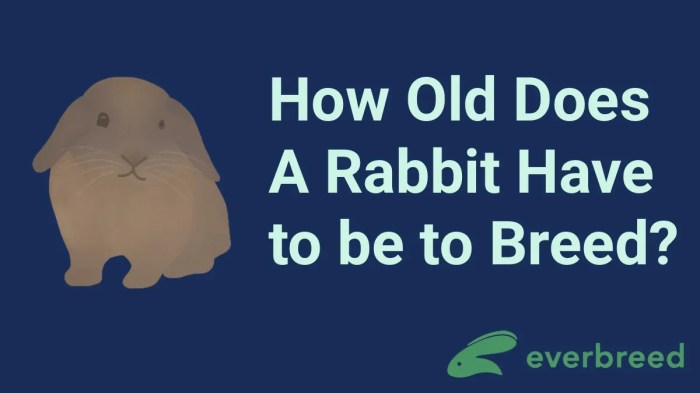Rabbit breeding is a multifaceted topic that requires a comprehensive understanding of the species’ biology, health, and legal implications. One crucial aspect is determining the optimal age for breeding to ensure the well-being of both the rabbits and their offspring.
This article delves into the age of sexual maturity, physical signs of readiness, best breeding practices, health considerations, and legal and ethical considerations related to rabbit breeding.
Understanding the appropriate age for breeding rabbits is essential for successful and responsible rabbit ownership. By exploring the various factors that influence the age of sexual maturity, the physical signs that indicate readiness, and the potential risks associated with breeding at different ages, rabbit breeders can make informed decisions that prioritize the health and well-being of their animals.
Physical Signs of Readiness
Recognizing the physical signs that indicate a rabbit is ready to breed is crucial to ensure successful and ethical breeding practices. These signs manifest as rabbits reach puberty, marking their physiological maturity and reproductive capability.
Male Rabbits (Bucks)
- Enlarged testicles
- Mounting behavior
- Increased aggression towards other males
Female Rabbits (Does)
- Vulva swelling
- Nest-building behavior
- Increased urination to attract males
Breeding Practices

Responsible breeding practices are essential for maintaining the health and well-being of rabbits. This includes understanding the ideal age for breeding, potential risks, and complications associated with breeding rabbits too young or too old.
The optimal age for breeding rabbits varies depending on the breed and individual maturity. Generally, most breeds should be at least 6-8 months old before breeding, allowing sufficient time for physical and reproductive development.
Risks of Breeding Too Young
- Immature reproductive systems, leading to difficulty conceiving or carrying a litter.
- Increased risk of birth defects or complications during pregnancy and labor.
- Reduced litter size and overall reproductive success.
Risks of Breeding Too Old
- Decreased fertility and litter size.
- Increased risk of complications during pregnancy and labor, including uterine inertia or prolapse.
- Reduced lifespan and overall health of the breeding doe.
Recommended Breeding Ages for Different Rabbit Breeds
| Breed | Ideal Breeding Age |
|---|---|
| Miniature Rex | 6-8 months |
| Holland Lop | 7-9 months |
| Lionhead | 8-10 months |
| French Lop | 9-12 months |
| Giant Flemish | 10-14 months |
Health Considerations
Breeding rabbits at different ages has varying implications for their health. Understanding these implications is crucial for responsible breeding practices.
Breeding rabbits too young, before they have reached sexual maturity, can pose significant risks to both the mother and her offspring. Young rabbits may not be physically or emotionally ready for breeding, which can lead to complications during pregnancy and childbirth.
Breeding Too Young
- Physical Immaturity: Young rabbits may not have fully developed reproductive organs, which can increase the risk of birth defects and other health issues in the offspring.
- Nutritional Deficiencies: Young rabbits may not be able to provide adequate nutrition for their offspring, leading to low birth weights, stunted growth, and increased susceptibility to disease.
- Emotional Stress: Breeding can be a stressful experience for young rabbits, who may not be equipped to handle the demands of motherhood.
Legal and Ethical Considerations
In many regions, there are no specific legal regulations regarding the breeding age of rabbits. However, breeders have a moral and ethical responsibility to ensure the well-being of their animals. This includes providing appropriate care, nutrition, and veterinary attention.
Responsible Breeding Practices
Ethical rabbit breeders prioritize the health and welfare of their animals. They follow best practices to ensure that rabbits are not bred too young or too often, which can lead to health problems and reproductive issues. Responsible breeders also ensure that rabbits are paired with compatible partners and that the breeding process is conducted in a safe and stress-free environment.
Closure
In conclusion, the age at which rabbits should be bred is a critical factor that impacts their health, the success of the breeding process, and the well-being of the offspring. By considering the age of sexual maturity, physical signs of readiness, best breeding practices, health implications, and legal and ethical considerations, rabbit breeders can ensure that their rabbits are bred at an appropriate age, promoting their overall well-being and contributing to responsible and ethical rabbit breeding practices.
Q&A
What is the average age of sexual maturity for rabbits?
The average age of sexual maturity for rabbits varies depending on the breed, but it typically ranges from 3 to 6 months.
What are the physical signs that indicate a rabbit is ready to breed?
Physical signs of readiness include a change in behavior, such as increased restlessness or aggression, as well as physical changes, such as the development of a dewlap (a fold of skin under the chin) in males and a swollen vulva in females.
What are the potential risks of breeding rabbits too young or too old?
Breeding rabbits too young can lead to health problems for the mother and offspring, while breeding rabbits too old can result in decreased fertility and an increased risk of complications during pregnancy and birth.
Are there any legal or ethical considerations regarding the breeding age of rabbits?
Some countries and regions have laws or regulations regarding the breeding age of rabbits, and it is important for breeders to be aware of these regulations to ensure compliance.